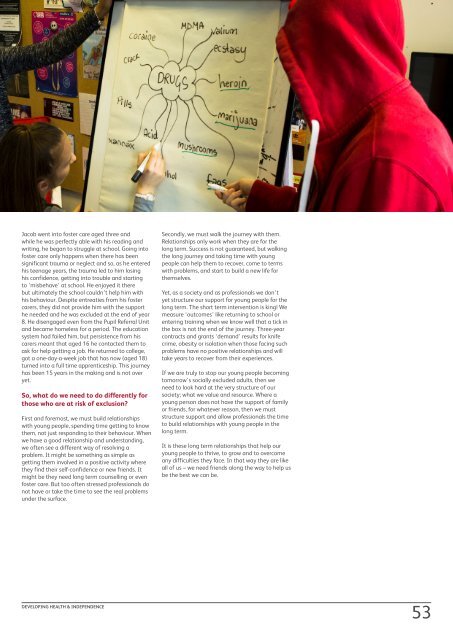The Vision Project
Throughout 2019, Developing Health & Independence (DHI), have been marking their 20th anniversary as a charity by looking to the future. Through articles, events and podcasts, they've asked people to answer the question of how we can achieve their vision of ending social exclusion. This collection of articles includes the contributions of experts from across public life and the political spectrum.
Throughout 2019, Developing Health & Independence (DHI), have been marking their 20th anniversary as a charity by looking to the future. Through articles, events and podcasts, they've asked people to answer the question of how we can achieve their vision of ending social exclusion. This collection of articles includes the contributions of experts from across public life and the political spectrum.
You also want an ePaper? Increase the reach of your titles
YUMPU automatically turns print PDFs into web optimized ePapers that Google loves.
Jacob went into foster care aged three and<br />
while he was perfectly able with his reading and<br />
writing, he began to struggle at school. Going into<br />
foster care only happens when there has been<br />
significant trauma or neglect and so, as he entered<br />
his teenage years, the trauma led to him losing<br />
his confidence, getting into trouble and starting<br />
to ‘misbehave’ at school. He enjoyed it there<br />
but ultimately the school couldn’t help him with<br />
his behaviour. Despite entreaties from his foster<br />
carers, they did not provide him with the support<br />
he needed and he was excluded at the end of year<br />
8. He disengaged even from the Pupil Referral Unit<br />
and became homeless for a period. <strong>The</strong> education<br />
system had failed him, but persistence from his<br />
carers meant that aged 16 he contacted them to<br />
ask for help getting a job. He returned to college,<br />
got a one-day-a-week job that has now (aged 18)<br />
turned into a full time apprenticeship. This journey<br />
has been 15 years in the making and is not over<br />
yet.<br />
So, what do we need to do differently for<br />
those who are at risk of exclusion?<br />
First and foremost, we must build relationships<br />
with young people, spending time getting to know<br />
them, not just responding to their behaviour. When<br />
we have a good relationship and understanding,<br />
we often see a different way of resolving a<br />
problem. It might be something as simple as<br />
getting them involved in a positive activity where<br />
they find their self-confidence or new friends. It<br />
might be they need long term counselling or even<br />
foster care. But too often stressed professionals do<br />
not have or take the time to see the real problems<br />
under the surface.<br />
Secondly, we must walk the journey with them.<br />
Relationships only work when they are for the<br />
long term. Success is not guaranteed, but walking<br />
the long journey and taking time with young<br />
people can help them to recover, come to terms<br />
with problems, and start to build a new life for<br />
themselves.<br />
Yet, as a society and as professionals we don’t<br />
yet structure our support for young people for the<br />
long term. <strong>The</strong> short term intervention is king! We<br />
measure ‘outcomes’ like returning to school or<br />
entering training when we know well that a tick in<br />
the box is not the end of the journey. Three-year<br />
contracts and grants ‘demand’ results for knife<br />
crime, obesity or isolation when those facing such<br />
problems have no positive relationships and will<br />
take years to recover from their experiences.<br />
If we are truly to stop our young people becoming<br />
tomorrow’s socially excluded adults, then we<br />
need to look hard at the very structure of our<br />
society; what we value and resource. Where a<br />
young person does not have the support of family<br />
or friends, for whatever reason, then we must<br />
structure support and allow professionals the time<br />
to build relationships with young people in the<br />
long term.<br />
It is these long term relationships that help our<br />
young people to thrive, to grow and to overcome<br />
any difficulties they face. In that way they are like<br />
all of us – we need friends along the way to help us<br />
be the best we can be.<br />
DEVELOPING HEALTH & INDEPENDENCE<br />
53




